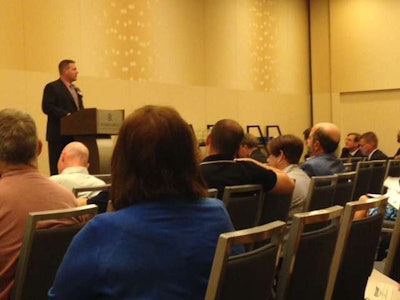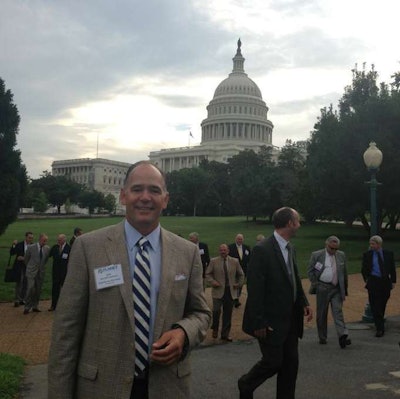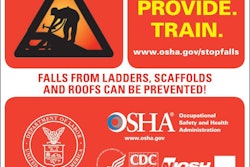 Landscapers were briefed about the different issues before meeting with their representatives on Capitol Hill.
Landscapers were briefed about the different issues before meeting with their representatives on Capitol Hill.During PLANET’s, the Professional Landcare Network’s, Legislative Day on the Hill, more than 100 members representing 26 states flooded Capitol Hill to raise issues in to the landscaping industry.
Some of the issues discussed included health care, tick-borne diseases, the “Water of the United States Regulatory Overreach Protection Act” and immigration reform.
During one meeting in the office of Georgia Rep. Austin Scott, who chairs the House Agriculture Subcommittee on Horticulture, Research, Biotechnology and Foreign Agriculture, it was revealed that in September, he plans to introduce a pollinators House bill that includes the type of science and research PLANET has been vying for.
Here is a breakdown of topics discussed during Legislative Day on the Hill:
Health Care and Seasonal Workers
PLANET and several allied associations, including the Society of American Florists, AmericanHort, and the National Restaurant Association, have been working to educate Congress about the complex treatment of seasonal workers under the Affordable Care Act (ACA). As a result of these efforts, Reps. Jim Renacci (R-Ohio), Jim Costa (D-Calif.), Lynn Jenkins (R-Kan.), and Kurt Schrader (D-Ore.) introduced H.R. 5213, “Simplifying Technical Aspects Regarding Seasonality Act of 2014,” to make it easier for seasonal employers to comply with the ACA.
The legislation defines “seasonal employee” as a worker who is employed on a seasonal basis for 6 months or less during the calendar year, consistent with Department of Treasury regulations. The draft bill would also remove seasonal employees from the formula used to determine if a business is a large employer for the purposes of ACA compliance. Under the bill, large employers would not need to offer health insurance to seasonal workers who work less than six months during the year.
 Jim McCutcheon, PLANET president and owner of HighGrove Partners, was just one of the landscapers who shared their industry concerns during the PLANET event.
Jim McCutcheon, PLANET president and owner of HighGrove Partners, was just one of the landscapers who shared their industry concerns during the PLANET event.Pesticide Regulations
On July 31, the House passed legislation to eliminate a permit requirement for pesticides already subject to federal regulations. Passage of the bill, 267-161, comes three days after it failed to win approval under suspension of the rules. The problem remains in the Senate with Sen. Barbara Boxer (D-Calif.) blocking it and Sen. Harry Reid (D-Nev.) refusing to bring it up for a vote.
Pollinators
On June 20, President Obama issued a Presidential Memorandum on “Creating a Federal Strategy to Promote the Health of Honey Bees and Other Pollinators.”
House Pollinator Caucus Co-Chairs Alcee L. Hastings (D-Fla.) and Jeff Denham (R-Calif.) introduced H.R. 4790, “The Highways Bettering the Economy and Environment Act (Highways BEE Act).” PLANET supports this legislation. Introduced May 30, the Highways BEE Act would direct the Secretary of Transportation to use its existing authority and funding to encourage the installation of pollinator habitats along highway rights of ways (ROWs).
Note: Bee health and the possible impact of neonicotinoid insecticide use have been in the news recently. One aspect of this issue that has not been well covered in these stories is a documentation of actual use and value of these products—they are commonly used to produce healthy, insect-free lawns and landscapes. For that reason, PLANET cooperated with AgInfomatics is conducting a survey to learn more about the value of insecticides to help supply data to the EPA.
Waters of the United States
On March 25, the Environmental Protection Agency (EPA) and the U.S. Army Corps of Engineers released a proposed regulation that will greatly expand the scope of waters subject to Clean Water Act (CWA) regulation. The comment period on the proposed rule was extended until Oct. 20. Numerous senators and members of Congress have sent letters to the EPA expressing concerns with the scope of the rule and several congressional committees have held hearings on the proposed measure. Given that the EPA and the Corp will need to respond to all of the comments before finalizing a proposal, we anticipate that a final rule will not be issued for at least 18 months.
DOL Proposed Wage and Hour Regulation
On March 13, the administration released a Presidential Memorandum directing the Department of Labor (DOL) to propose revisions to modernize and streamline overtime regulations. Most workers covered under the Fair Labor Standards Act receive overtime pay. However, the DOL’s upcoming regulations will change the overtime exemption for executive, administrative, and professional employees (often referred to as the “white collar exemption rules).
H-2B Reform
While the prospects for broader H-2B reform along the lines of legislation introduced by Rep. Andy Harris (R-Md.) in March are tied to the broader immigration reform debate, PLANET has been advocating for targeted relief through the appropriations process. Specifically, we are asking that Congress do the following:
Prohibit the Department of Labor from implementing any new H-2B wage rule that does not preserve an employer’s right to use private wage surveys and that does not provide for a multitier wage methodology in which wages are tied to experience.
- Allow employers to bring H-2B workers into the United States on “staggered schedules” as they ramp up or wind down for the season.
- Reinstate the H-2B returning worker exemption. The first half cap was hit in mid-March of this year.
At the state level:
Colorado
PLANET contributed and signed on with the Coloradans for Responsible Pesticide Application (CRPA) to a position paper to help address renewal of their state pesticide law that sun stetted and needs to be renewed but is being target by anti-pesticide groups for major changes.
Florida
Florida’s political landscape is being upended by a landmark legal ruling that one legal expert says could influence the way other states draw their congressional districts. A circuit judge ruled that the state Legislature illegally drew Florida’s congressional districts to primarily benefit the Republican Party. Judge Terry Lewis ruled that two of the state’s 27 congressional districts were invalid and that the map must be redrawn.
Maryland
Montgomery County, Maryland, is poised to introduce an ordinance about regulating pesticides use on lawns and turf on public and private property. The proposal could impact professionals and homeowners. The draft proposal reflects the desire of a group of voters opposed to pesticide use. It does not reflect the perspective of the majority of voters in the county. PLANET is monitoring and feels it is essential that the industry becomes engaged and that they ask their customers to engage in the discussion. Those that do business there have to start the discussion with your customers so they will have the information they need to speak up and share their perspective when the time comes.
North Carolina
Fertilizer pre-emption was passed with very continuous wording with some in the industry with opposing views base on was this language better than no pre-emption and if killing it for another try next year a better direction. It now awaits the governor’s signature
Wisconsin
The Wisconsin Supreme Court determined that spraying a pesticide is an “inherently dangerous activity” therefore both the contractor and the individual landowner that hired the contractor are responsible for taking precautions to reduce risk of off-site damage and may be liable for damage caused by a commercial applicator to a neighboring property.
Washington, D.C. Government
PLANET submitted comments to the District’s Department of the Environment, which is proposing the most extensive changes to the city’s pesticide operation regulations since they were first issued in 1978.










